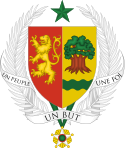Please tell us which country and city you'd like to see the weather in.
| President of the Republic of Senegal |
|
|---|---|
 Coat of Arms of Senegal |
|
| Term length | 7 years, renewable once |
| Inaugural holder | Léopold Sédar Senghor |
| Formation | 6 September 1960 |
| Senegal |
 This article is part of the series: |
|
|
|
Other countries · Atlas Politics portal |
The President of Senegal is the head of state of Senegal. According to the 2001 Constitution, the president is elected for a 5 year term; this was changed back to the pre-2001 seven-year term in 2008, though incumbent president Macky Sall has stated he wants to have it reverted to five-year terms.[1]
This is a list of the Presidents since Senegal became independent from France in 1960.
Contents |
Presidents of Senegal (1960–Present) [link]
Senegalese Progressive Union (UPS) / Socialist Party of Senegal (PSS)
Senegalese Democratic Party (PDS)
Alliance for the Republic (APR)
| # | Portrait | Name (Born-Died) |
Term of Office | Party | |
|---|---|---|---|---|---|
| 1 |  |
Léopold Sédar Senghor (1906–2001) |
6 September 1960 | 31 December 1980 | UPS (until 1976) PSS (from 1976) |
| 2 |  |
Abdou Diouf (b. 1935) |
1 January 1981 | 1 April 2000 | PSS |
| 3 | Abdoulaye Wade (b. 1926) |
1 April 2000 | 2 April 2012 | PDS | |
| 4 |  |
Macky Sall |
2 April 2012 | Incumbent | APR |
Latest election [link]
See also [link]
References [link]
External links [link]
|
|||||||||||||||||||||||
|
|
|||||
https://wn.com/List_of_Presidents_of_Senegal

Senegal
Coordinates: 14°N 14°W / 14°N 14°W
Senegal (![]() i/ˌsɛnᵻˈɡɔːl, -ˈɡɑːl/;French: le Sénégal), officially the Republic of Senegal (French: République du Sénégal [ʁepyblik dy seneɡal]), is a country in West Africa. Senegal's economical and political capital is Dakar. It is the westernmost country in the mainland of the Old World, or Eurafrasia, and owes its name to the Sénégal River, which borders it to the east and north. The name "Senegal" comes from the Wolof "Sunuu Gaal," which means "Our Boat." Senegal covers a land area of almost 197,000 square kilometres (76,000 sq mi) and has an estimated population of about 13 million. The climate is Sahelian, but there is a rainy season.
i/ˌsɛnᵻˈɡɔːl, -ˈɡɑːl/;French: le Sénégal), officially the Republic of Senegal (French: République du Sénégal [ʁepyblik dy seneɡal]), is a country in West Africa. Senegal's economical and political capital is Dakar. It is the westernmost country in the mainland of the Old World, or Eurafrasia, and owes its name to the Sénégal River, which borders it to the east and north. The name "Senegal" comes from the Wolof "Sunuu Gaal," which means "Our Boat." Senegal covers a land area of almost 197,000 square kilometres (76,000 sq mi) and has an estimated population of about 13 million. The climate is Sahelian, but there is a rainy season.
Cultures and influences
The territory of modern Senegal has been inhabited by various ethnic groups since the prehistoric era. Organized kingdoms emerged around the seventh century, and parts of the country were ruled by prominent regional empires such as the Wolof. The present state of Senegal has its roots in European colonialism, which began during the mid-15th century, when various European powers began competing for trade in the area. The establishment of coastal trading posts gradually gave way to control of the mainland, culminating in French rule of the area by the 19th century, albeit amid much local resistance. Senegal peacefully attained independence from France in 1960, and has since been among the more politically stable countries in Africa.

Senegal River
The Senegal River (French: Fleuve Sénégal) is a 1,086 km (675 mi) long river in West Africa that forms the border between Senegal and Mauritania.
Geography
The Senegal's headwaters are the Semefé (Bakoye) and Bafing rivers which both originate in Guinea; they form a small part of the Guinean-Malian border before coming together at Bafoulabé in Mali. From there, the Senegal river flows west and then north through Talari Gorges near Galougo and over the Gouina Falls, then flows more gently past Kayes, where it receives the Kolimbiné. After flowing together with the Karakoro, it prolongs the former's course along the Mali-Mauritanian border for some tens of kilometers till Bakel where it flows together with the Falémé River, which also has its source in Guinea, subsequently runs along a small part of the Guinea-Mali frontier to then trace most of the Senegal-Mali border up to Bakel. The Senegal further flows through semi-arid land in the north of Senegal, forming the border with Mauritania and into the Atlantic. In Kaedi it accepts the Gorgol from Mauritania. Flowing through Bogué it reaches Richard Toll where it is joined by the Ferlo coming from inland Senegal's Lac de Guiers. It passes through Rosso and, approaching its mouth, around the Senegalese island on which the city of Saint-Louis is located, to then turn south. It is separated from the Atlantic Ocean by a thin strip of sand called the Langue de Barbarie before it pours into the ocean itself.
Radio Stations - Dakar
RADIO STATION |
GENRE |
LOCATION |
|---|---|---|
| WALF 1 DAKAR | News Talk,News,World Africa | Senegal |
| WALIANE FM DAKAR | Folk,World Europe,World Africa | Senegal |
| DakarMusique | World Tropical | Senegal |
| ZikFM | Pop,R&B,World Africa | Senegal |
Podcasts:
Senegal
ALBUMS
- Grandes del candombe - VOL.5 released:
Grandes del candombe - VOL.5
- Amor de comparsa
- Botija de mi país
- Potpurrí para Pedro Ferreira
- Candombe Roto
- Cuerda de Tambores
- Por un adiós
- Potpurrí para Morandi
- Potpurrí Kanela
- Cuerda de tambores
- Los colores del Tambor
- Estamba del milongón
- Cuerda de tambores
- Baile de los morenos
- Potpurrí Candela
- Cuerda de tambores
- Potpurrí para Rada


